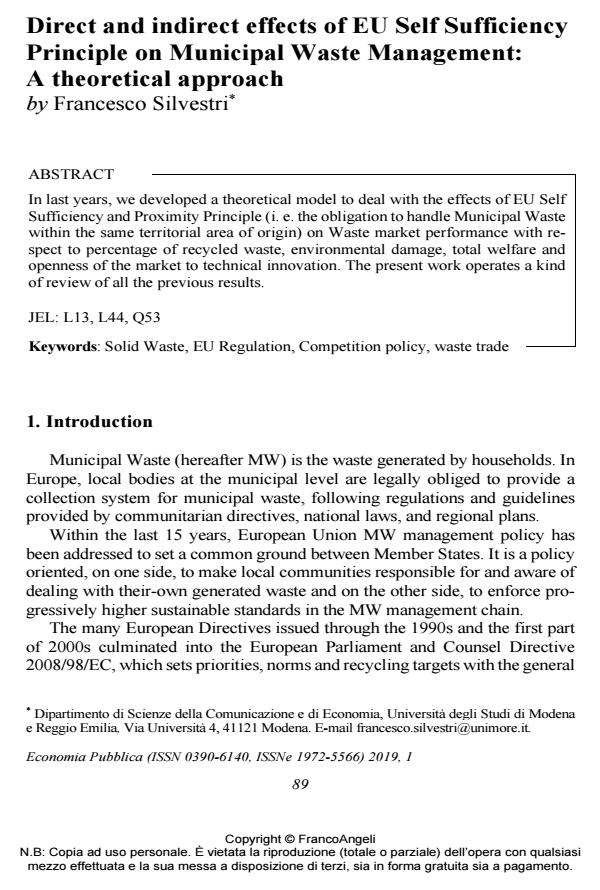Direct and indirect effects of EU Self Sufficiency Principle on Municipal Waste Management: A theoretical approach
Journal title ECONOMIA PUBBLICA
Author/s Francesco Silvestri
Publishing Year 2019 Issue 2019/1 Language English
Pages 10 P. 89-98 File size 155 KB
DOI 10.3280/EP2019-001005
DOI is like a bar code for intellectual property: to have more infomation
click here
Below, you can see the article first page
If you want to buy this article in PDF format, you can do it, following the instructions to buy download credits

FrancoAngeli is member of Publishers International Linking Association, Inc (PILA), a not-for-profit association which run the CrossRef service enabling links to and from online scholarly content.
In last years, we developed a theoretical model to deal with the effects of EU Self Sufficiency and Proximity Principle (i. e. the obligation to handle Municipal Waste within the same territorial area of origin) on Waste market performance with respect to percentage of recycled waste, environmental damage, total welfare and openness of the market to technical innovation. The present work operates a kind of review of all the previous results.
Keywords: Solid Waste, EU Regulation, Competition policy, waste trade
Jel codes: L13, L44, Q53
- Almer C., Goeschl T. (2010). Environmental crime and punishment: empirical evidence from the German penal code. Land Economics, 86(4).
- Baumol W., Panzar J. & Willig R. (1982). Contestable Markets and the Theory of Industrial Organization. New York: Harcourt Brace Jovanovich.
- Buclet N., Fischer L., Hafkamp W. & Petschow U. (2002) Three scenarios for the organisation of MSW management in Europe. In: Buclet N. (Editor), Municipal waste management in Europe: European policy between harmonisation and subsidiarity. Amsterdam: Kluwer.
- Choe C., Fraser I. (1998). The economics of household waste management: a review. The Australian Journal of Agricultural and Resource Economics, 42(3).
- Choe C., Fraser I. (1999). An economic analysis of household waste management. Journal of Environmental Economic Management, 38(2).
- D’Alisa G., Walter M., Burgalassi D. & Healy H. (2010), Conflicts in Campania: waste emergency or crisis of democracy. Ecological Economics, 70(2).
- D’Amato A., Zoli M. (2012) Illegal waste disposal in the time of the Mafia: a tale of enforcement and social well-being. Journal of Environmental Planning Management, 55(5).
- Demsetz H. (1968). Why regulate utilities? Journal of law and economics, 11.
- Fullerton D., Kinnaman T.C. (1995). Garbage, recycling and illicit burning or dumping. Journal of Environmental Economics and Management, 29.
- Hotelling H. (1929). Stability in competition. The Economic Journal, 39.
- Jha V., Markandya A. & Vossenaar R. (1999). Reconciling trade and the environment: lessons from case studies in developing countries. Cheltenham: Edward Elgar.
- Laffont J.J., Tirole J. (1994). A theory of incentives in procurement and regulation. Cambridge: MIT Press.
- Massarutto A., De Paoli L. (2007), Dalla sindrome NIMBY alla gestione del conflitto ambientale. Economia delle Fonti di Energia e dell’Ambiente, 2.
- Massarutto A., Silvestri F. (2016). Free municipal waste trade as an incentive to recycling. A theoretical study. Economics and Policy of Energy and the Environment, 3.
- Reggiani C., Silvestri F. (2017). Municipal solid waste, market competition and the EU policy. Environment & Resource Economics.
- Silvestri F. (2017). Competition and Environmental quality as conflicting objectives: the case of the European Municipal Waste industry. Economia Politica.
- Williamson O. (1976). Franchise bidding for natural monopolies – in general and with respect to CATV. Bell Journal of Economics, 7(1).
Francesco Silvestri, Direct and indirect effects of EU Self Sufficiency Principle on Municipal Waste Management: A theoretical approach in "ECONOMIA PUBBLICA " 1/2019, pp 89-98, DOI: 10.3280/EP2019-001005